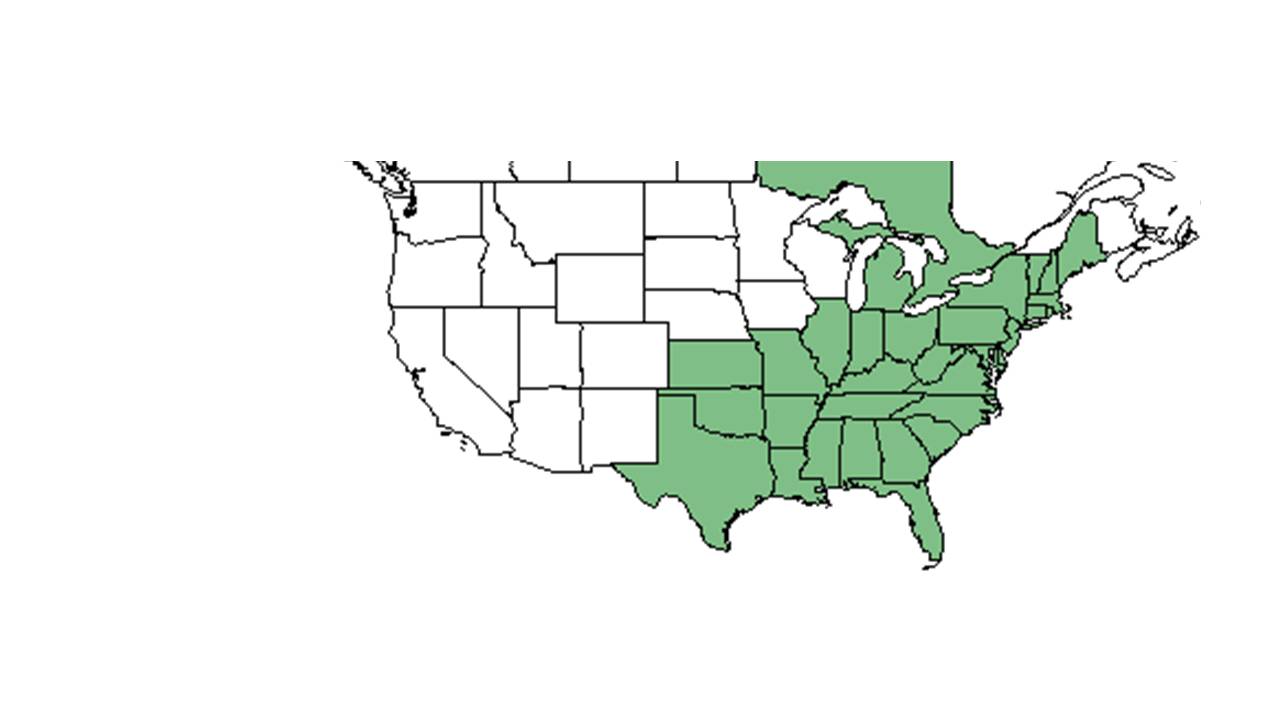Difference between revisions of "Dichanthelium sphaerocarpon"
KatieMccoy (talk | contribs) |
|||
| Line 15: | Line 15: | ||
| binomial_authority = (Elliott) Gould | | binomial_authority = (Elliott) Gould | ||
| range_map = DICH_SPHA_dist.jpg | | range_map = DICH_SPHA_dist.jpg | ||
| − | | range_map_caption = Natural range of ''Dichanthelium sphaerocarpon'' from USDA NRCS [http://www.plants.usda.gov Plants Database]. | + | | range_map_caption = Natural range of ''Dichanthelium sphaerocarpon'' from USDA NRCS [http://www.plants.usda.gov/core/profile?symbol=DISP2 Plants Database]. |
}} | }} | ||
Revision as of 18:53, 15 October 2015
| Dichanthelium sphaerocarpon | |
|---|---|

| |
| Scientific classification | |
| Kingdom: | Plantae |
| Division: | Magnoliophyta - Flowering plants |
| Class: | Liliopsida – Monocotyledons |
| Order: | Cyperales |
| Family: | Poaceae ⁄ Gramineae |
| Genus: | Dichanthelium |
| Species: | D. sphaerocarpon |
| Binomial name | |
| Dichanthelium sphaerocarpon (Elliott) Gould | |

| |
| Natural range of Dichanthelium sphaerocarpon from USDA NRCS Plants Database. | |
Common name: roundseed panicgrass
Synonym: Panicum sphaerocarpon Elliott
Contents
Taxonomic notes
Description
Dichanthelium sphaerocarpon is a perennial graminoid.
Distribution
Ecology
Habitat
Dichanthelium sphaerocarpon occurs in a variety of natural and disturbed communities. It is abundant in barrens habitats[1], but also occurs in pine-oak flatwoods and woodlands, mixed hardwood floodplains, pine forests, cabbage palm hammocks, and on loessial banks, the edges of open brackish marshes, and sand dunes (FSU Herbarium). It is also able to grow in disturbed areas, especially in higher light levels (FSU Herbarium). D. sphaerocarpon has been found in power line corridors, clear-cuts, roadsides, ditches, firebreaks, and old fields (FSU Herbarium). This species seems to prefer sandy or loamy soils, but can tolerate a range of moisture levels, from dry to wet (FSU Herbarium).
Phenology
Flowering and fruiting has been observed in Florida in February through November (FSU Herbarium).
Seed dispersal
Seed bank and germination
Fire ecology
It increased from being absent to 19 plots within the span of six years after an early dormant-season fire in 1989 at Gibbons Creek Barrens.[1]
Pollination
Use by animals
Diseases and parasites
Conservation and Management
Cultivation and restoration
Photo Gallery
References and notes
Florida State University Robert K. Godfrey Herbarium database. URL: http://herbarium.bio.fsu.edu. Last accessed: June 2014. Collectors: Loran C. Anderson, T. MacClendon, K. MacClendon, Cecil R Slaughter, Lisa Keppner, Ed Keppner, R. Kral, Richard Carter, Charles M. Allen, Sidney McDaniel, Randy Haynes, Paul L. Hallister, Ken Rogers, Louise Rogers, Lloyd H. Shinners, Duane Isely, S L Welsh, Dwight Isely, Bayard Long, John W. Thieret, D J Banks, Fred B Jones, A. E. Radford, R. L. Wilbur, James D. Ray, Jr., Robert F. Thorne, Bob Brown, W. T. Batson Jr., H. L. Blomquist, R.K. Godfrey, P. L. Redfearn, H. Kurz, Bruce Hansen, JoAnn Hansen, Gil Nelson, Angus Gholson, Chris Cooksey, Kevin Oakes, Richard R. Clinebell II, J. M. Kane, C. Nelson, A. Clebsch, Annie Schmidt, A. Johnson, and M. Jenkins. States and Counties: Alabama: Geneva, Houston, Lee, and Monroe. Arkansas: Franklin and St. Francis. Florida: Bay, Calhoun, Collier, Escambia, Flagler, Franklin, Gulf, Holmes, Jackson, Leon, Liberty, Taylor, Wakulla, and Washington. Georgia: Baker, Dougherty, Grady, and Thomas. Kentucky: Lyon. Louisiana: Allen, Caldwell, Jackson, Ouachita, St Mary, and Union. Mississippi: Holmes, Jones, Lowndes, and Pearl River. North Carolina: Beaufort, Brunswick, Craven, and Granville. New Jersey: Gloucester. Tennessee: Putnam. Texas: Freestone, Nueces, San Augustine, and Van Zandt. Virginia: Princess Anne and Prince George. Other Countries: Honduras.